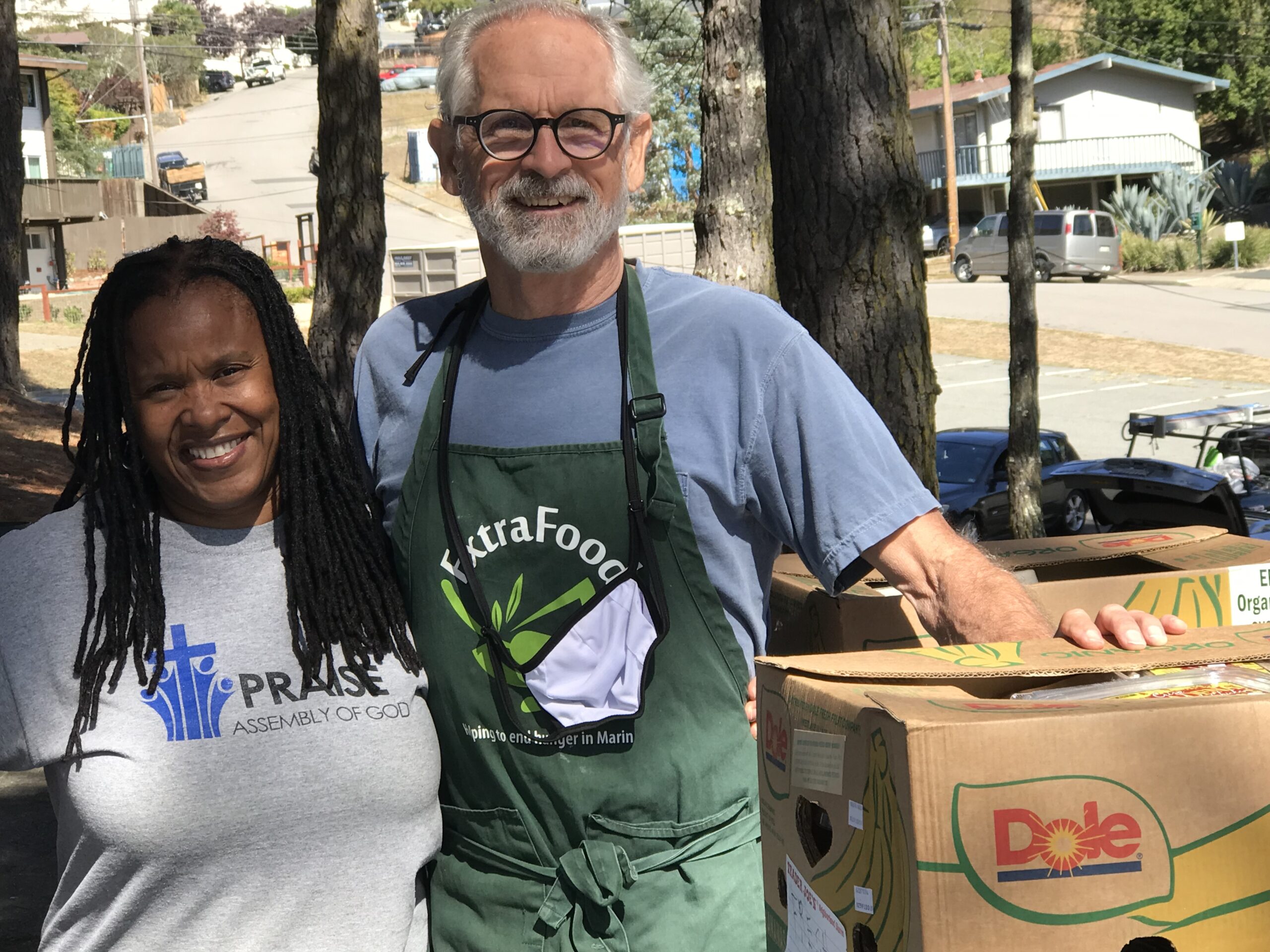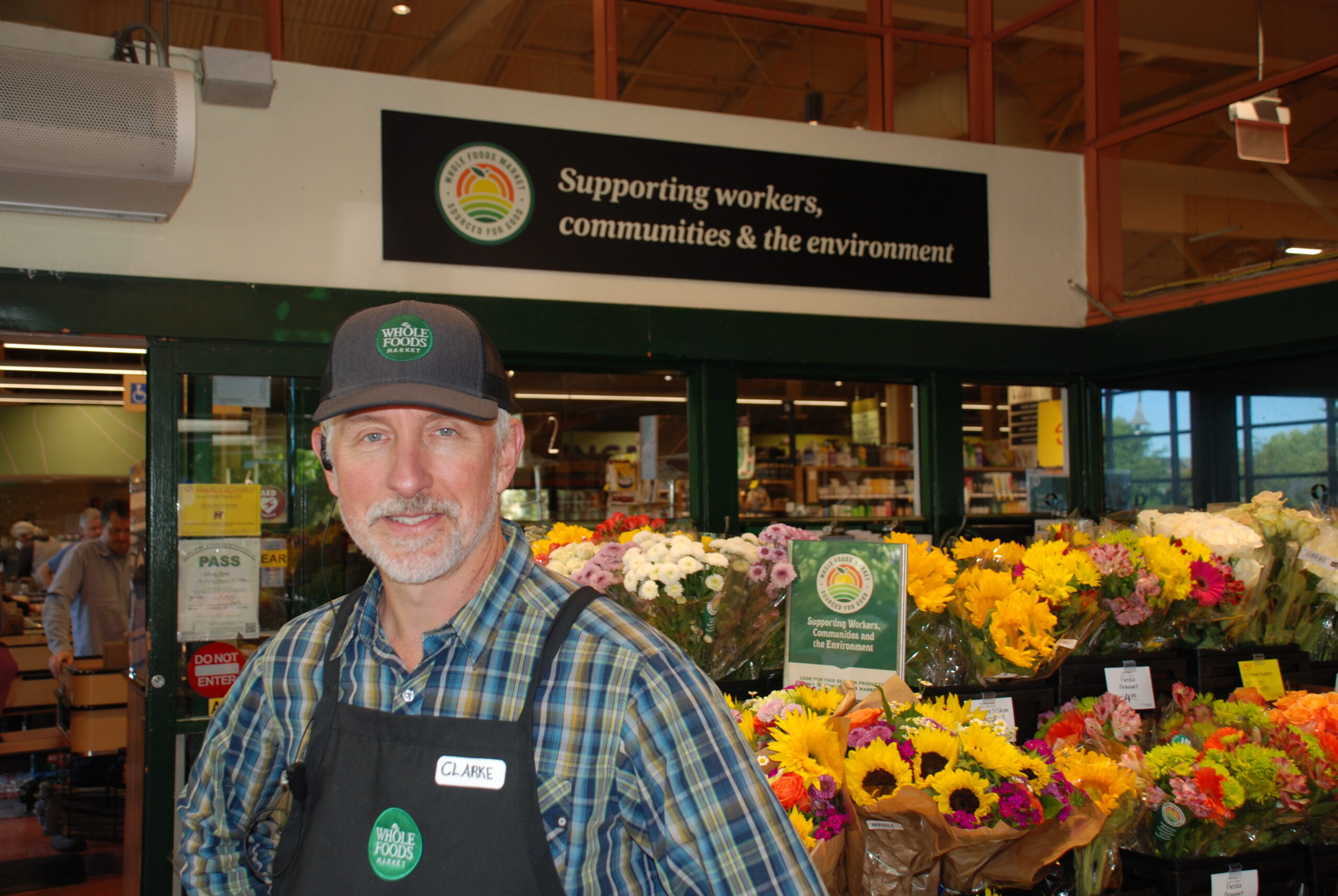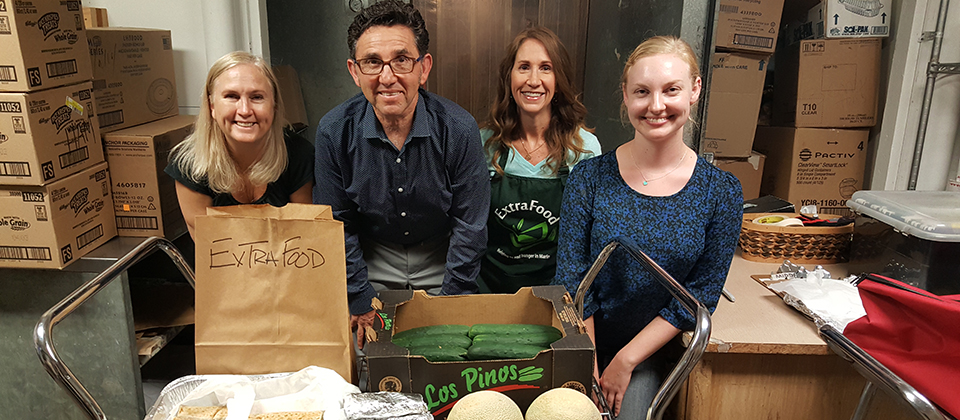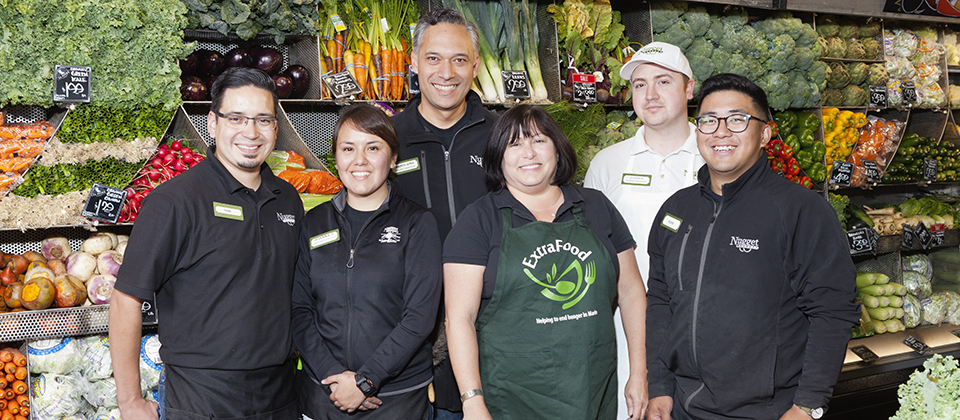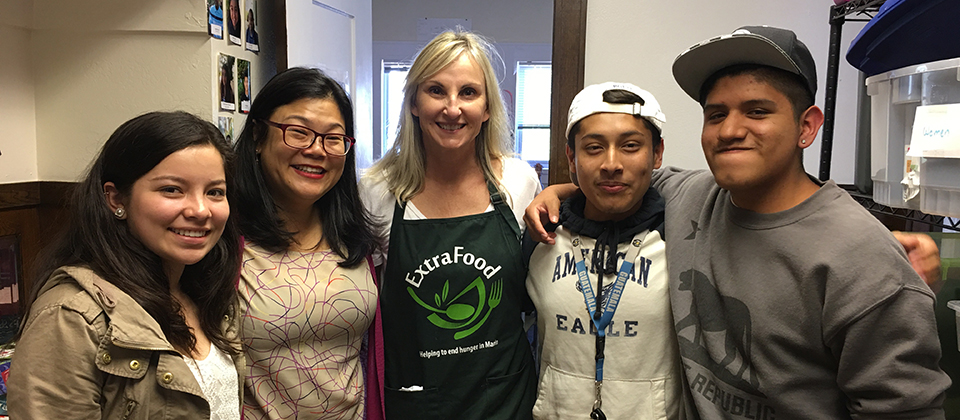Food waste and hunger are massive global problems, but ExtraFood volunteers know that there is action we can take right here in Marin. Our volunteers are on call 365 days a year to pick up excess fresh food from businesses and schools and deliver it to local nonprofits, making sure it ends up on tables instead of in landfills. In Marin, many people are at risk of food insecurity, and yet massive amounts of fresh surplus food gets thrown away every day. When food decomposes in a landfill, it releases methane, a greenhouse gas that fuels climate change 86 times faster than carbon dioxide. By rescuing food we can not only solve hunger and food waste in Marin, but also help fight the climate crisis. With the enormous help of our volunteers, ExtraFood is food recovery with “the human touch.”
One way that ExtraFood volunteers help out those in need is at the end of the day at the farmers’ markets. There is usually a surplus of excess healthy food that doesn’t sell each week. So our volunteers pick up food from each stall, sort it and then deliver it to various nonprofit distribution partners that serve Marin’s most vulnerable children, seniors, and families.
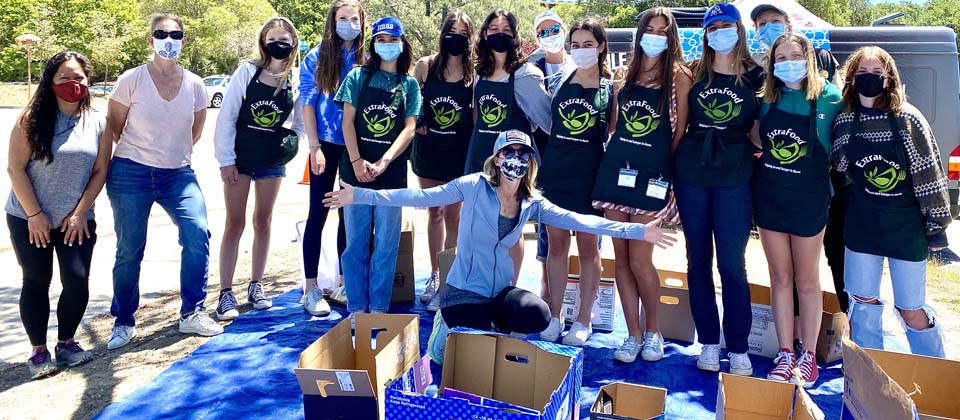
The farmers get a tax donation and don’t have to worry about transporting food back to their farms and the nonprofit organizations receive fresh fruits and vegetables that they would otherwise not have access to. The National Charity League has a dedicated crew of mothers and daughters that volunteer the first of every month at the Sunday AIM Farmers’ Market. Cindy Patrizi and her daughters have been volunteering for two years and says “we love giving back to the community and knowing we are helping others in need. Working with the vendors, other volunteers and helping people that need the food is very rewarding.”
One of the recipients of the produce is St. Andrew Presbyterian Church in Marin City. Yaker, the Food Pantry Coordinator, says “you have blessed us beyond measure and have transformed the experience for our food pantry clients. There is much more variety in the produce we now have to offer. We love everything you bring us. Joy has returned to my heart. Thank you to the generous farmers who shared their bounty with us!”
Another volunteer that is passionate about food rescue includes Dennis Orwig. Dennis was our Volunteer of the Year in 2020 and has completed over 870 food donation trips. His wife Vickie learned about ExtraFood from a friend and suggested he consider volunteering. Once he attended the orientation and did a few trips he was hooked. Dennis says, “learning about how ExtraFood helps address issues of food insecurity here in our community, prevents food waste and decreases CO2 production from food wasting in landfills, make it a great fit for someone with my values and priorities”.
Dennis makes regular food trips from Safeway and Trader Joe’s to local nonprofits such as Marin City Senior Center and St. Vincent de Paul Society. Vickie has completed over 125 trips and joins Dennis on many of his trips as well – what a great team!
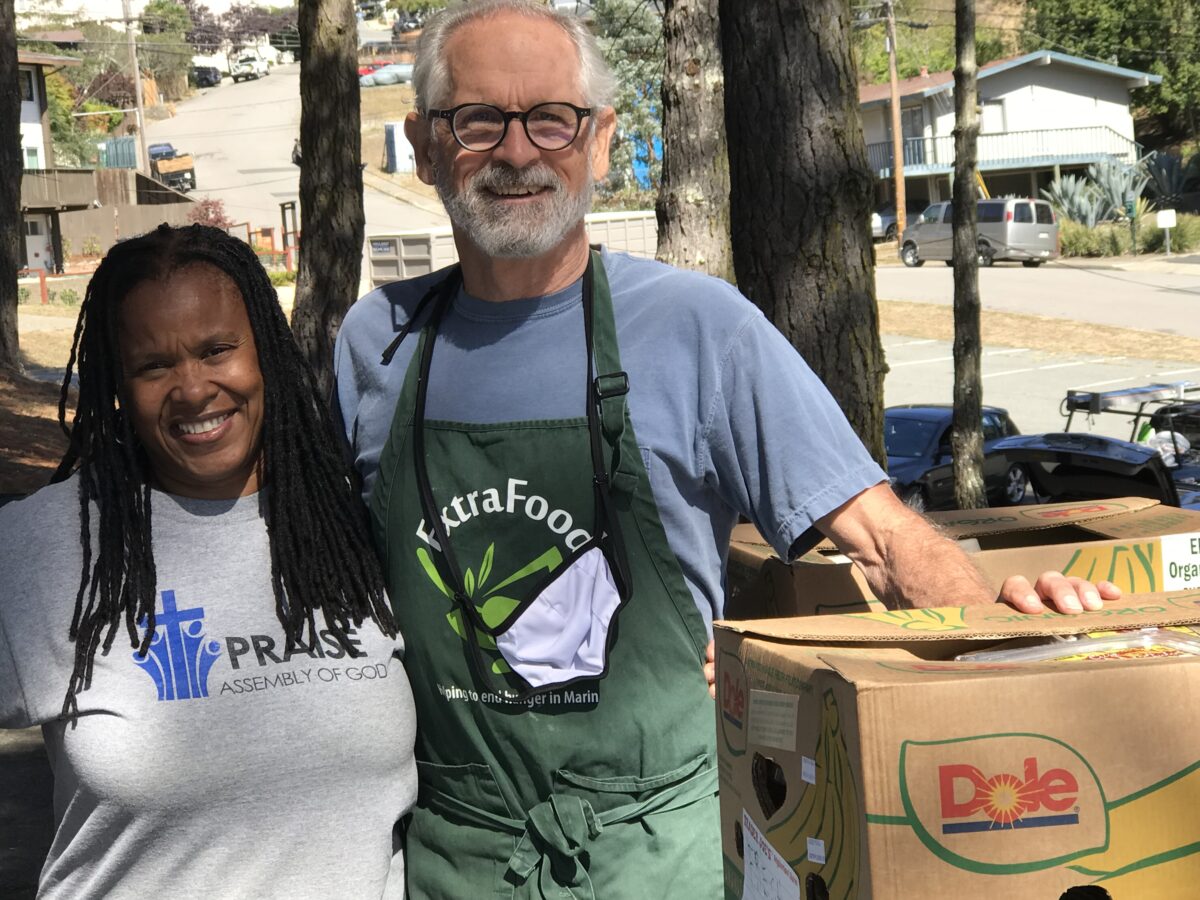
ExtraFood appreciates all of our passionate volunteers that pick up and deliver excess fresh food 365 days a year. Since our founding, over 750 volunteers have donated over 60,000 volunteer hours – an incredible accomplishment. Together we are leading a movement to transform Marin’s food system – from wasting food to donating it.
ExtraFood partners with Whole Foods Market
Thirty-five percent of all food in the United States is wasted. Yet here in Marin, 1 in 5 people worry about where their next meal will come from. ExtraFood was started in 2013 to help businesses and schools donate their excess fresh food instead of throwing it into landfills, where it is a major cause of greenhouse gas emissions and the climate crisis. The rescued food is immediately delivered by our volunteers and staff drivers to those that need it most—vulnerable children, seniors and families. ExtraFood works closely with many nonprofit distribution partners like after-school programs, senior housing centers and homeless shelters, staying up to date on exactly what they need and when. We find and deliver food that matches those needs, at no cost to the food donor or the recipient. Our innovative food recovery program operates 365 days a year and every week reaches 8,000 at-risk people in our community.
When an individual or family faces food insecurity, they often cannot afford foods like fresh fruits and vegetables. That’s why ExtraFood’s partnerships with businesses such as grocery stores are so important—they provide our community with nutritious food that those living in poverty might otherwise not have access to. It’s not just about providing food for low-income families and seniors, it’s
about providing food that’s fresh and nutritious.
One of our many food donor partners is Whole Foods Market on Miller Avenue in Mill Valley. They have partnered with ExtraFood since 2014 and have diverted hundreds of tons of their high-quality food straight from their shelves to help those in need.
One of Whole Foods’ company values is, “we care about our communities and the environment,” which makes them a great partner for ExtraFood. Whole Foods improved their internal systems, in conjunction with ExtraFood, in order to double their food donations in one year, and their donation process happens quickly and efficiently. Clarke Pomeroy, Store Team Leader, says, “I’m passionate about food donation in general because I don’t want to see food wasted. It’s one of my favorite parts of my job as we are doing something for the community and making a positive impact. The employees are really proud [of our donation program], and they want to know that the food is going to people that need it. A lot of them work here because the values we have as a company are their own values and it’s critical that we honor that.”
ExtraFood is proud to partner with Whole Foods Market — we make it easy for them to donate their excess fresh food to serve people struggling with hunger in our community.
Our goal is to make food recovery a way of life in our community: to enroll every possible business and school in our program, and capture every possible pound of excess food, as we work together toward the day when everyone in our community has the food they need.
If you’re a business or school with excess food, we would love to partner with you. Fill out our form at ExtraFood.org and we’ll get in touch with you. It’s free, it’s easy and it will make a difference in the lives of those who are most vulnerable in the North Bay.
Marin’s largest school district leads the way in reducing food waste.
Miguel Villarreal Helps Solve Food injustices in Marin County
Miguel Villarreal was five years old, sitting in front of the television in his family’s home in Idaho. He was watching fitness and health expert Jack LaLanne talk about wellness. Jack’s words had a huge impact on Miguel, and ultimately shaped the direction of his life.
Fast-forward to today and you’ll find Miguel is the Food and Nutrition Services Director of Novato Unified School District (NUSD). He is responsible for feeding 8,000 K-12 students in 13 schools. In Miguel’s mission to help the students eat healthier, including eliminating 36 tons of sugar every year since 2004, and eliminating saturated fats from their diets, he noticed another problem in the district’s food system: food waste.
Minimizing food waste and donating food to people in need
The journey to Miguel’s discovery of food waste in NUSD’s system began when he learned about the tremendous amount of edible food rotting in farmers’ fields. A migrant whose family moved from Texas to farm the lands of Idaho, Miguel has the mindset of a farmer. Food that’s too big, too small or oddly shaped shouldn’t be squandered, it should be eaten. So, with Marin Organic, he created a gleaning program and brought Marin County families, and his own staff, to the fields to learn, and to pick tomatoes, potatoes, beets and other produce left to waste. Over time, Miguel connected back to how NUSD treated unused, edible food and it hit him: Instead of sending good food to the landfill, he could donate excess food to those in need. This would help solve the problem of NUSD’s edible food waste while also helping to alleviate hunger in Marin.
Miguel is always looking for efficiencies. He has brought rigor to NUSD’s food program, including ways to minimize food waste upfront. He orders just the right amount of ingredients and steadfastly orchestrates just-in-time deliveries. But like any food business, there are certain factors that cause unused, edible food to go uneaten. Whether it’s a matter of kids’ changing tastes (despite NUSD’s thorough meal-testing process before a dish becomes a menu item), kids absent from the cafeteria because they’re on a school fieldtrip, or students’ change-of-mind about what they want to eat, there are untouched meals remaining at the end of the school day.
In 2015, Miguel partnered with ExtraFood, the only countywide food recovery program of its kind in Marin. ExtraFood works closely with Marin nonprofit partners that serve low-income children, adults, and families, staying up-to-the-minute on their food needs. ExtraFood’s staff locates donations from businesses that meet those needs, and volunteers pick up and deliver the food in less than 30 minutes, at no cost to donors or recipients. What might normally end up in the landfill goes to help many of the 50,000 vulnerable people in Marin who need extra food the most. Half of those people are children and seniors.
“When I started working for Novato Unified School District in 2002, there was no locally-grown produce being offered to the students. That’s an injustice. Today, we offer plenty of it to our kids, but not all the food is used. We had been throwing away perfectly good, healthful food at the end of the day – produce and prepared food – instead of providing it to families in the community who could benefit from it. That’s an injustice. Thanks to our local farmers and ExtraFood, both of these injustices have been resolved in our efforts to improve the culture of wellness in our schools and our community,” says Miguel.
Knowing he wanted to get staff invested in the ExtraFood program, Miguel brought in Marv Zauderer, founder of ExtraFood. Marv shared real-life stories with staff about the people in Marin who need more food – the many families that often have to face the choice of paying for food or paying their mortgage or medical bills.
The staff now has a deep appreciation for the donation program. Martha Ochoa, food service manager at Lynwood Elementary says, “I’m so happy someone is using the food. I’m proud to prepare the food for others, and to work at NUSD.”
“Preparing the food is easy,” says Christine Sirianni, food services assistant at Lynwood. “We wrap it, label it, and ExtraFood volunteers pick it up when it’s convenient for us.”
There are other substantial benefits to donating excess food. It saves the money it would cost to dispose of the waste, provides a tax deduction and decreases impact on the environment by redirecting food away from landfill.
Food donations go a long way to providing healthy food to those in need
One of ExtraFood’s recipients of NUSD’s donations is the YMCA’s Hamilton Child Care program at Hamilton School in Novato. NUSD sends things like chicken tenders, sandwiches, pasta with sauce and meatballs, and burritos – a selection the children are happy to eat.
Because the YMCA is a nonprofit, the food donations allow them to reserve what they would spend on food for other services that help the community. For example, some of their families have been homeless, so the YMCA has covered childcare for their children.
“ExtraFood gets us the food we need,” says Nana Sosa, site coordinator at Hamilton Child Care. “Their donations save us 20 percent every month that we can give back to the community in the form of services.”
ExtraFood also delivers NUSD’s food to Ritter Center in San Rafael who provides a critical safety net to 300 of Marin’s low-income and homeless adults and children. Meat and cheese burritos, spaghetti, Chinese food, sandwiches and enchiladas are a few of the types of food donated.
“The food is high quality and nutritious. It’s food that people want,” says Shaun Marshall, services and volunteer coordinator at Ritter Center. “If we didn’t get the donations, some of the homeless we serve would go without dinner.”
This is exactly the kind of impact Miguel seeks to make in the community. “The benefits reside with the recipients and the goodwill that comes from this program,” says Miguel. “Food has always been a unifier of people and ExtraFood has allowed us to unite with our community in a manner that is beneficial to both of us.”
Striving for zero waste and donating high-quality food for Marin residents who need it most.
Building Community Through Food Donations
It’s no surprise that Marin County is one of the wealthiest counties in America. The median income is $91,529 and housing costs are some of the highest in the nation.
What might be surprising is that one in five of the county’s residents are food insecure: they worry about where their next meal will come from. That’s nearly 50,000 people in Marin, half of them children and elderly, who don’t have a steady supply of nutritious food on which they can depend. Many are hardworking families struggling to put food on the table every day. Others are seniors who have to choose between buying food and medication. And many who are homeless or veterans.
Yet, unlike other problems Marin County may have, the community has the power to solve this critical issue by harnessing the county’s abundant resources and collaborative spirit.
Stewardship: Nugget Markets’ guiding philosophy
Many of Marin’s grocery stores, school districts, caterers, event venues and other food businesses end up with unused edible food, much of which goes into landfill. Some businesses are starting to recognize that there are better ways to handle excess food than throwing it away.
Nugget Markets is one of those companies. Celebrating its 90-year anniversary, Nugget Markets has 12 stores across Northern California including three stores in Marin County.
The company was started with stewardship as its guiding philosophy. Nugget Markets defines stewardship as being rooted in the communities it serves, and nurturing them socially and environmentally.
“We look out for each other, we respect each other,” says Eddie Reduta, dairy manager at the Corte Madera store. “We want to help build up lives and actively be a part of the life here. That extends to the community outside the store and how we feed and nurture those around us.”
Several years ago, Nugget Markets hired a dedicated director of sustainability, Jeremy Patin. Jeremy has been expanding the company’s sustainability practices and weaving stewardship into every aspect of the business, from company headquarters to its warehouses, and into every store.
Nugget Markets’ stewardship has expanded into new areas. From organizations the company supports through their community giving efforts, to how they protect the environment, to helping employees live more sustainable and balanced lives, they’ve always been about doing business with heart.
“We are an added extension to the community,” says Jeremy. “We’re a bigger family than a group of people who come to work every day.”
The company has taken on the important and laudable goal of achieving zero waste. Jeremy examines the company’s resource use and has been instituting company-wide practices for scaling back its environmental impact. In addition to reducing water and electricity usage, food waste has been put under the microscope. In the past two years, Nugget Markets has diverted 70 percent of their waste from landfill. How are they able to do this? One way is through food donations.
Dual purpose: Achieving zero waste and bringing quality food to those in need
Whether food is reaching a manufacturer’s expiration date, produce isn’t perfect or seasonal buying habits shift, there are things out of a grocer’s control that create a certain amount of excess. Nugget Markets has a high standard of quality, and as a result, must pull food from shelves sooner than they’d like. This means food that’s still delicious, nutrient-rich and ready to eat needs a home. Their food donations span a wide variety of foods including fruits, vegetables, juice, eggs, fresh-baked breads, pies, yogurt and milk – foods that low-income families and individuals often can’t afford to buy.
Congress recently enhanced tax incentives for businesses donating food to nonprofits. But that’s not the only way food donors can save money while giving back.
“Putting focus on diverting waste saves us money through cutting back on having waste hauled away,” says Kanoa Aipia, store director at the Corte Madera store. “These are byproducts of being more conscious about what we do.”
For their food donation program, Nugget Markets looks for local partners whose standards meet their own. Before opening their Marin stores, Jeremy contacted ExtraFood. Through their countywide food recovery program, ExtraFood picks up surplus, fresh food from Marin businesses and brings it directly to those who need it.
Nugget Markets chose ExtraFood for their intimate knowledge of the community’s needs. ExtraFood works closely with Marin nonprofit partners that serve low-income children, adults and families, staying up-to-the-minute on their food needs. ExtraFood then locates and delivers food donations that meet those needs.
Equally important to Nugget Markets is that their donation partners deliver the food at the level of quality the store provides to their own customers. This means deliveries need to be made quickly, a unique service ExtraFood provides. ExtraFood’s flexible volunteer team picks up Nugget Market’s donations – six times per week from the Corte Madera store – and delivers the food to its recipient partners in less than 30 minutes.
“Nugget Markets puts together high-quality food,” says Kathy Margolis, an ExtraFood volunteer. “And their employees are always friendly and happy to make the donations.”
The company provides ongoing training and education at every level of the organization. There is a “Green Guru” in each store who looks for more ways to cut back on waste and increase sustainability. Each store has a technology platform for communicating daily updates to its 1,800 employees. Messages go beyond what everyone is supposed to do every day, and talk about why they’re doing it. This gets employees invested in programs such as donating, recycling and composting, while the training they receive creates the discipline and the procedures.
“There’s a lot of education that goes into why we do what we do,” says Eric Stille, CEO of Nugget Markets. “We don’t ask employees to go through the motions, but instead help them understand our approach to sustainability.”
The impact of Nugget Markets’ donations is felt throughout the company. Beyond reducing their environmental footprint, employees appreciate what the company is doing to help vulnerable people.
“Donating food helps breathe life into the community, and ExtraFood makes it easy for us,” says Eddie Reduta. “I don’t have to deal with the guilt of throwing things away that people really need.”
ExtraFood delivers Nugget Markets’ food to several recipients, including People’s Inter-City Fellowship church in Marin City, one of the areas in Marin County most affected by poverty. In a community of roughly 2,600 people, there are no grocery stores and no easy ways for people to get to stores in nearby towns.
The food donations to the church are critical. ExtraFood’s deliveries started at one time per week serving children at the Marin City Recreation Center, and grew to daily deliveries. The Center ran out of space, forcing the program to move the donations to the church in order to accommodate all the people who need food.
“Kids come when their parents aren’t home and they don’t have food in the house,” says Leticia Jones, director of DT (Doing Things) at Marin City Recreation and a member of the church. “People with babies who live on food stamps come for milk. Seniors who need food at the end of the month when their government benefit checks run out come for a bag of groceries.”
Rotary Manor, an independent senior residence in San Rafael, also benefits from ExtraFood’s deliveries of Nugget Markets’ donations. The deliveries supplement the food of residents living on fixed incomes or those who need the extra help to make ends meet.
“Being a senior and self-employed with a fluctuating income, the food donations really help out,” says Gena Galenski, a resident at Rotary Manor.
The effect on people in the community reaffirms to Nugget Markets that their partnership with ExtraFood is working. And the more food businesses that get involved in ExtraFood’s program, the more progress the community can make toward solving food waste and hunger in Marin County.
“Our donations go beyond a program and become an extension of our belief that we are members of the community,” says Eric Stille. “We have a role to play and value to add. If we each do our part, we can make a big difference.”
Food Donations Help Break the Cycle of Poverty
Next Generation Scholars helps middle and high school students from Marin’s low-income families reach their dreams of getting into college. The organization is housed in a small white building in downtown San Rafael; if you blink, you could miss it. But big changes are happening inside. One hundred percent of their students go to college and 98 percent of those students graduate, helping them and their families break the cycle of poverty.
“Next Generation families make an average of $23,000 a year. There is not much a family can do with that income in Marin County other than struggle to get by. As a result, families are often trapped in their circumstances. Next Generation Scholars creates a path out of poverty for their students and their families, 98% of whom are Latino.”
The program blends rigorous academics with wrap-around social services that include housing resources, immigration legal services, a free clothing store, access to medical services, free prescription glasses and food. Next Generation’s model is built on the fact that kids don’t do well in school if their basic needs aren’t being met.
Meeting students’ basic needs
Sally Matsuishi is the Executive Director of Next Generation and founded the organization 10 years ago. If you ask her what makes the program work, she says, “Balancing high-expectations curricula with meeting basic needs helps us uplift communities. Our students can read Angela Davis and the great works of Latin American authors, and get hot meals, mental health and medical access, and housing referrals for their families.”
Next Generation families make an average of $23,000 a year. There is not much a family can do with that income in Marin County other than struggle to get by. As a result, families are often trapped in their circumstances. Next Generation Scholars creates a path out of poverty for their students and their families, 98% of whom are Latino.
One of the many critical services Next Generation provides to students is a food program, which includes The Hot Meal Program and Summer Academy Lunches. Study after study shows that hunger and poor nutrition negatively impact a child’s ability to do well in school, making it difficult for a child from a low-income family to escape their economic circumstances. Next Generation provides two hot meals plus a snack to each student every day. The program also sends food home with kids when they don’t have enough time to eat at Next Generation because they are so focused on their studies. This guarantees them a healthy, hot dinner. And, there is often enough food to share with their families.
ExtraFood’s donations support kids’ learning
In the early days of the program, Next Generation was handling meal planning and preparation on their own. It was an expensive effort with a $15,000 annual budget, not including the staff time needed to make the meals. The resources put toward the meal program were taking away from investing in books, microscopes and teacher training. Sally knew they had to retool their approach to the food program because without education, these kids would be hard-pressed to make better lives for themselves.
About three years ago, Next Generation began to source food donations. Since then, they have received regular donations from ExtraFood, the only countywide food recovery program of its kind in Marin. ExtraFood works closely with Marin nonprofit partners that serve low-income children, adults and families, staying up to the minute on their food needs. ExtraFood’s staff locates donations of excess food from businesses that meet those needs and volunteers pick up and deliver the food in less than 30 minutes, at no cost to donors or recipients. What might normally end up in the landfill goes to help many of the 50,000 vulnerable people in Marin who need extra food. Half of those people are children and seniors.
ExtraFood’s donations began in the nick of time. Next Generation had just doubled the size of their program to 80 kids during the school year who were eating the two meals and a snack each day. During the summer, they were serving three meals a day to 100 kids. That’s over a thousand meals each year. “Food donations give me the freedom to focus on educating the students,” says Sally.
Hugo Anaya is 17 years old and has been a Next Generation Scholar for four years. His mom doesn’t drive, and his neighborhood – San Rafael’s Venetia Valley – is a food desert. Combine both factors and eating health is a challenge. ExtraFood’s donations provide nutritious foods such as chicken, rice, burritos and fresh produce – items the students might not otherwise have access to, and the kind of food that helps them be healthy enough to thrive in school.
Next Generation shares the ExtraFood donations with kids outside the program too. The students bring friends, siblings and cousins who may not have eaten for a day or more to share the program’s food. Sally also gets calls from teachers at the local high school with stories about kids who haven’t eaten breakfast or lunch. They’re working as hard as they can to do well in school so they can build better lives for themselves, but that’s hard to do on an empty stomach. The teachers send students to pick up crates full of breakfast foods, produce and snacks they can eat throughout the school day to give them energy.
San Rafael’s Los Moles donates to Next Generation
One of ExtraFood’s donors who provides meals to Next Generation students and their families is Los Moles, a Mexican restaurant in San Rafael that’s owned and operated by Lito Saldana. Lito’s donations include freshly made rice, beans, meat and moles – mouth-watering sauces used in traditional Mexican cooking. His goal is to educate the Latino community on their culinary heritage and familiarize them with real Mexican food from a healthy perspective – he doesn’t use sugar, lard or gluten in his dishes.
“Community is important to me as a person and as a business,” says Lito. “I donate because I know people don’t have enough money to eat well.”
Lito’s wide variety of moles are now one of Next Generation families’ favorite things to eat. Not only do they taste delicious, they feel like home. Because of Los Moles, every kid now has a story from their parents about when they were back in their home countries – how they’d pick up spices, grind them on the spot and take them home to cook beloved family dishes.
“Eating in all cultures and loving a child are so intertwined,” says Sally. “Los Moles is giving that back where it’s needed.”
Prepared food means more quality family time
Food justice is often about numbers: who has food, how many people have food. But sending food home also helps Next Generation’s parents and kids reclaim precious family time. Having enough healthy food is critical for a child’s well-being, but quality time with their parents is just as important for their development.
“The kids in this program are deeply loved,” says Sally. “Their parents have big dreams for them and have put blood, sweat and tears into moving them forward. It’s important for the students to spend time with their parents who they don’t get to see that much.”
Many parents work in construction, gardening, restaurants or cleaning houses. They drop their kids at 6:00 a.m. and pick them up at 7:00 p.m. after working hard all day. Feeling exhausted makes it difficult to face preparing dinner. And the time they’d spend cooking for their children is time they’d rather spend hearing about what they learned in school and what colleges they want to attend. That’s when the food Next Generation sends home can make a big difference to a family.
The food Next Generation provides also gives the students time back in their day. Vickie Diaz is 17 and has been in the program for three years. She says, “The food helps me because my parents work late. And if I get home late, I have to cook. But, if I eat at Next Generation, I can focus on my homework so that when I get home, I have time to shower and take care of my two younger siblings.”
“Beyond making sure kids have enough to eat,” says Sally, “the food donations relieve kids and their families of stress so they can focus on their school work and each other rather than worry about where their next meal will come from.”

